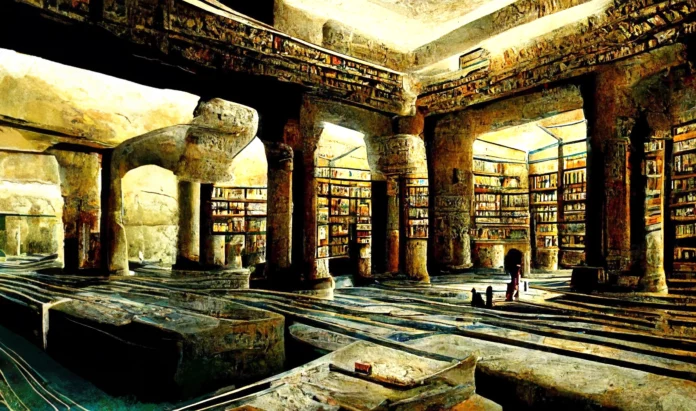The race to be the definitive repository of the world’s wisdom has consumed a slice of humanity since the advent of knowledge itself. From the Assyrian collection of clay tablets and Hadrian’s Library in Athens to Google and Wikipedia of the 21st century, the accumulation of the collective body of scholarship was pursued with the same zeal as art to a collector or coins to a numismatist.
:max_bytes(150000):strip_icc()/Library_of_Alexandria_sepia-3c464cd0bc5243f88635aaf261aa3b94.jpg)
But nothing could compare to the renown of the fabled Library of Alexandria in Egypt. While little is known about this bibliographic wonderland established over 2,300 years ago—when and why it was founded, how many scrolls it contained and what became of it—its very existence has captured the imagination of booklovers and seekers of knowledge ever since.

This Library, which was established by the first two Ptolemies of Egypt, Soter and Philadelphus, can be compared to the Google of the ancient world for more reasons than one. Over the course of its 1,000 years of existence, it used tactics that would today be deemed piracy or intellectual property theft. The Greek physician and philosopher Galen writes that Ptolemy III Euergetes was so hungry for more books that he would stop all ships and confiscate their books so that they could be copied for the library. This ancient method has merely given way to the more sophisticated computer hacking and cyberwarfare of our times.
In essence, Alexandria was the intellectual piracy center of the ancient world. Think China—a world power whose economic engine is reliant on stealing trade secrets from other countries.
Built in the fourth century BCE, the Library’s golden age lasted for some six centuries. It was the cultural and intellectual hub of the ancient Hellenistic world, and was rumored to contain the largest collection of manuscripts on the planet, including works by Plato, Aristotle, Homer and Herodotus on mathematics, history, law, science, medicine, poetry and culture. Some of the most brilliant minds of the period studied and taught within its walls. The Library eventually became so full that an additional complex, the Serapeum, was built.
The first authoritative history of the world was hashed out there. The circumference of the Earth was tallied with astonishing accuracy by its scholars. The exactitude of the lunar year—which differed from the calculations of Chazal by only a tiny fraction—was first presented in the Library by Hipparchus, the Einstein of his day whom the Tzemach Dovid, a historical record authored by the 16th-century chronicler Rav Dovid Ganz, a talmid of the Rema and Maharal, hailed as “the great mathematician.” The works of Euclid, who is cited several times by Rishonim, were preserved for posterity by the Library’s staff of over 100 and are still regarded as the basics of geometry.
The Jewish people have a connection to this Library as well, but it is one that is tinged with catastrophe: it is the building where the Targum Shivim, the Greek translation of the Torah, was housed, and Megillas Taanis tells us that this translation led to the establishment of a fast day on 8 Teves [it has since become part of the fast of Asarah B’Teves and is mentioned in the Selichos for that day].
Thomas Garlinghouse, PhD, is a longtime archeologist who has written extensively on many different subjects, and more recently about the fabled Library of Alexandria.
His passion for antiquity is evident as Garlinghouse talks about the Library, whose history is “a tale as complex and dramatic as any film.”

